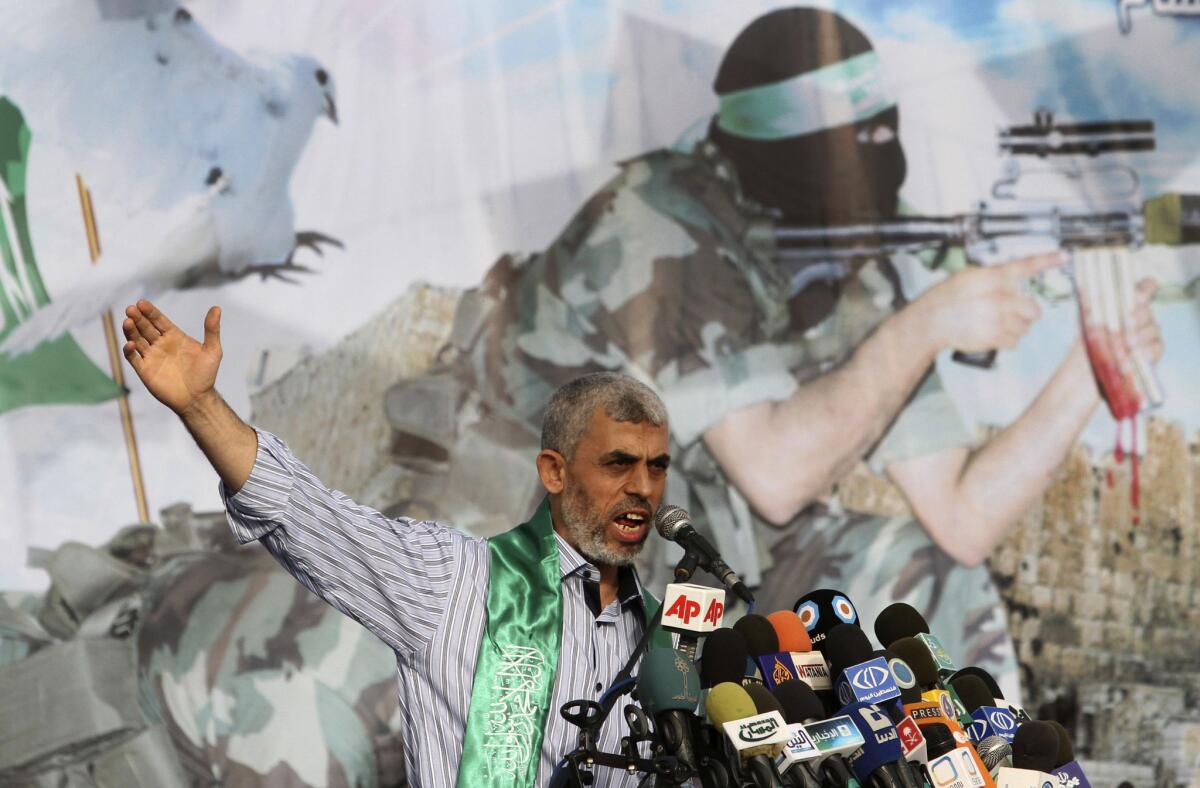Hamas names top militant commander as new hard-line leader in Gaza

- Share via
Reporting from Tel Aviv — The Palestinian group Hamas said on Monday that it chose a hard-line military chief as its new political leader in the Gaza Strip, a move seen by analysts as increasing the risk of a new outbreak of war between Gaza’s Islamist rulers and Israel.
Yehya Sinwar, 55, considered the No. 3 in Hamas’ military wing, was released by Israel in a 2011 prisoner swap after serving more than 20 years in jail, and is credited with helping to rebuild Hamas’ fighting force after a devastating seven-week war with Israel in 2014.
The Obama administration declared him to be a “special designated global terrorist” in 2015, prohibiting Americans from doing business with him.
The selection of Sinwar is seen as a victory for the military wing — which remains opposed to any sort of accommodation with Israel — at the expense of Hamas’ more pragmatic political wing, whose leaders have spoken about agreeing to a long-term truce.
The ascendance of the military wing chief, who will replace Hamas political wing leader Ismail Haniyeh in the role, is also seen as a blow to the prospects for mending a near decade-long rift between two competing Palestinian power centers: Hamas in Gaza and President Mahmoud Abbas’ secular Fatah party, which dominates the Palestinian Authority in the West Bank.
“It’s crystal clear that the military wing is the top decision maker in Hamas. It doesn’t seem that moderates within Hamas or political leaders are influential anymore,” said Mkhaimar Abusada, a political science professor at Gaza’s Al Azhar University. “It means we should start counting down the days to the eruption of a war with Israel.”
There’s been a relative calm along the Israel-Gaza border since the end of the 2014 war, which resulted in more than 2,100 Palestinian and several dozen Israeli deaths. The war caused billions of dollars of damage to Gaza’s economy and infrastructure, much of which has never been repaired.
See the most-read stories in World News this hour »
Isolated by Israeli and Egyptian blockades on the coastal territory, Hamas has sought to rebuild its military in anticipation of a new round of fighting even as it has observed a truce on hostilities against Israel.
Israeli government leaders said the selection of Sinwar was further evidence that the organization should be shunned as terrorist group.
“From today onward, the chairman of the Palestinian authority of Hamas in Gaza is a mass murderer, for all intents and purposes. The illusion that there exists a political and a military echelon was never correct, and today it has vanished,” said Avi Dichter, the chairman of the parliament’s foreign affairs and defense committee and a member of the ruling Likud Party.
“The message for us is that we must strengthen our means for destroying Hamas’ infrastructure in Gaza, because we might need to use them earlier than we expected.”
Sinwar was one of the founders of Hamas in the late 1980s, during the first Palestinian uprising against Israel. He was arrested by Israel in 1988 and sentenced to successive life terms in jail for the killings of Palestinians suspected of collaboration with Israel. Israel says he’s also linked to the kidnapping and killing of two Israelis.
Palestinians say he also supported Hamas’ violent takeover of the Gaza Strip from Fatah in 2007.
He went free when Israel released more than 1,000 prisoners in return for Sgt. Gilad Shalit, who was abducted from the Gaza border in 2006. Following the 2014 war, Sinwar was given the job of reviewing intelligence leaks that enabled Israel to target some of the organization’s top military leaders during the war.
The appointment is part of a larger transition in Hamas’ leadership: The organization is expected to hold internal elections to select a successor for its powerful external political leader, Khaled Meshaal. Haniyeh is considered a leading candidate.
The selection of the military chief also is seen as an indication of a shift toward Iran and away from patrons in the Persian Gulf and in Turkey. While Meshaal has cultivated ties and economic support from Qatar and Turkey, the military wing has preferred to seek hardware and assistance from Tehran.
“The fact that he was elected indicates a victory of the extremist radical line of Hamas,” said Kobi Michael, a former official in the Israeli Ministry of Strategic Affairs. “We are going to face difficult and challenging days.”
Special correspondent Mitnick reported from Tel Aviv and Abu Alouf from Gaza City.
ALSO
Netanyahu may seek to reset U.S.-Israel relations in meeting with Trump
Thousands march against Trump in Mexico City: ‘Pay for your own wall!’
By testing a missile, North Korea was probably also testing Trump, experts say
UPDATES:
4:15 p.m.: Updated throughout with staff reporting.
This article was originally posted at 7 a.m.
More to Read
Sign up for Essential California
The most important California stories and recommendations in your inbox every morning.
You may occasionally receive promotional content from the Los Angeles Times.










